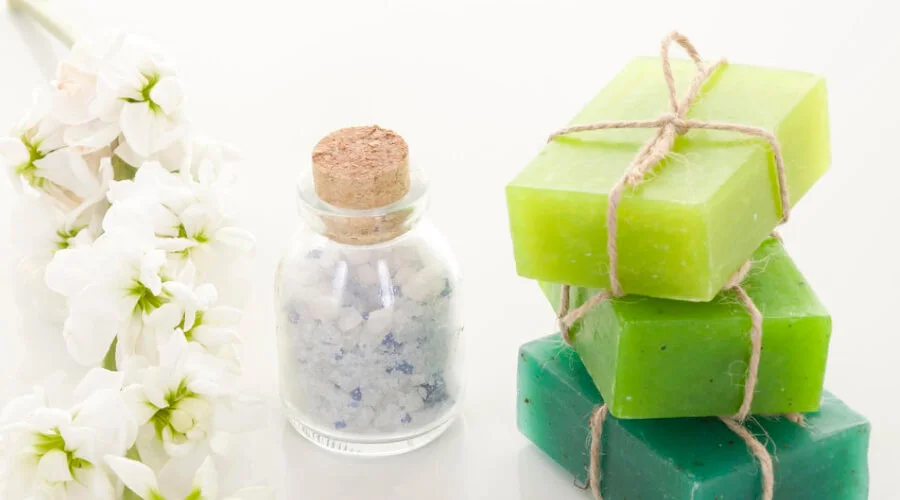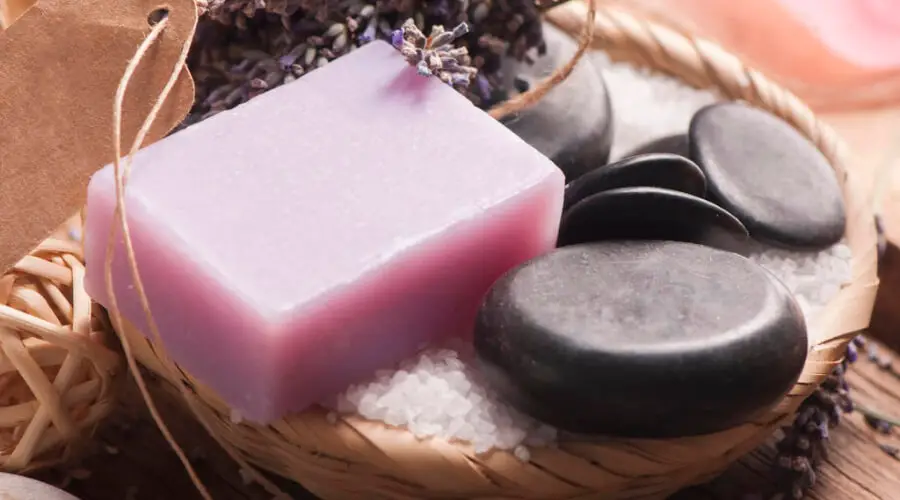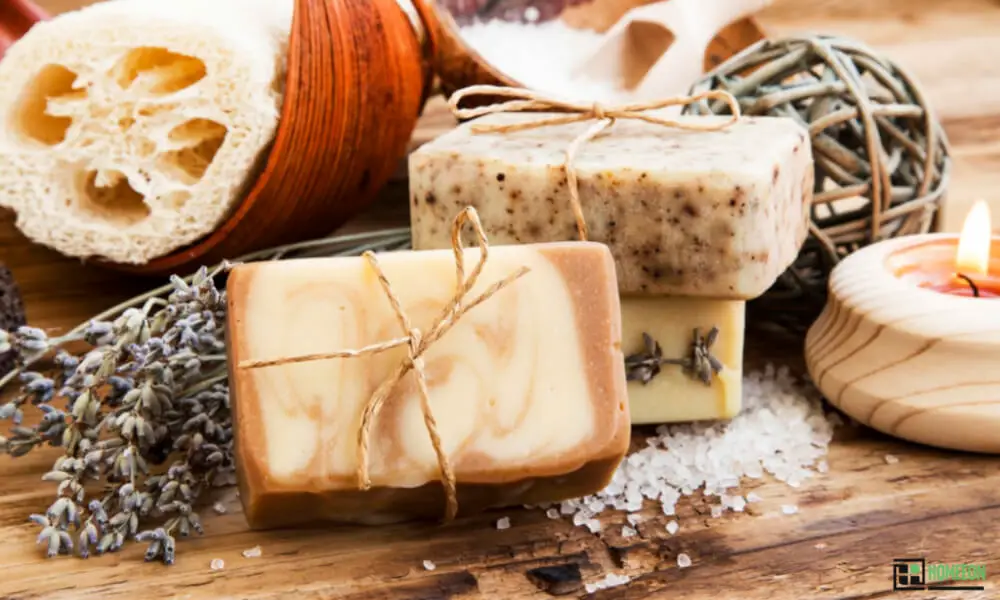Last Updated on July 30, 2023 By Emma W. Thomas
No, soap is not self-cleaning. Despite having some antibacterial properties, soap can accumulate germs and dirt with use. Regular rinsing and drying are necessary to prevent bacterial growth and maintain hygiene.
How Does A Bar Of Soap Work To Remove Germs?

According to the (CDC) Centers for Diseases Control and Prevention, a bar soap washes away microorganisms and dirt physically. Bar soap contains compounds known as surfactants which work to eliminate debris and germs as one adds water physically. If you rub a bar soap until it foams, it helps to wash away more dirt.
Bar soap with the label ‘antibacterial’ has chemical agents that will help to kill germs. However, according to CDC, antibacterial soap does not have any extra health benefits, and a plain soap will still be effective at removing germs on its own. As you rub the soap against your hands, it dilutes the microorganisms like bacteria on the soap. The germs will then be washed down the drain but, since not all of them may make it to the drain, it is important to clean your feet and tub frequently.
Can You Become Sick From Using Bar Soap?
It is unlikely that you can get ill from using a bar soap since most microorganisms on the soap will come from your body. Our natural microbiome does not cause health problems, and even if the soap picks up other bacteria, only less than one percent of these can make one sick. But, there are a few exceptions like;
- If you have an open wound, it can allow pathogens into your body, causing conditions like athlete’s foot.
- A person whose immune system is compromised and cannot fight against disease-causing organisms is more likely to get infected.
- Sharing a bar soap can help to transfer bacteria from one person to another. Viruses like flu or the common cold could be transmitted through the sharing of bar soaps.
How Can You Get Rid Of Bar Soap Germs?

While it is not probable to get ill from using bar soap, removing as many germs from it as possible is necessary. The following tips are helpful;
- Make your soap wet, then rub it against your hands for about 15 seconds to get a lather before you wash.
- Instead of using a loofah or washcloth to apply soap, use the bar directly on your body
- If you must use a washcloth, use a new one every time you shower, and make sure it is dry before using
- If you use the same loofah more than once, you can regularly toss it into a washing machine.
- Always make sure that your bar soap remains dry when not in use. You can use a soap dish with drain slats and avoid keeping it near a spray of water.
Does Washing Your Hands With Water And Soap Help To Get Rid Of Germs And Chemicals?
Yes. Washing hands with soap and water helps to remove chemicals and water. When you wet your soap and rub it into your hands to a lather, it traps the dirt and germs, thus removing them from your hands. To work up a better lather, be sure to wet your hands with clean water (either cold or warm) before applying the soap. A better lather forms pocket that traps germs and chemicals which are washed away into the drain after rinsing your hands.
It would help if you scrubbed your hands for not less than 20-seconds as this will help to destroy the germs and eliminate them from your skin physically.
Does Hygiene Help To Stop Infections?
Yes, good hygiene is necessary for preventing infections as it stops the spread of germs. Lack of hygiene, on the other hand, causes infections since;
- Unwashed hands introduce germs into your body when you touch your mouth, eyes, and nose.
- Disease-causing germs will grow in some foods when you prepare or eat with unwashed hands.
- It is easy to transfer germs from unwashed hands to tables, doorknobs, or toys. When other people touch these items, they may become ill.
Which Is The Correct Way To Wash Your Hands?
Washing your hands correctly is crucial, especially during this pandemic, since it helps eliminate germs and other disease-causing microorganisms. The following simple steps are appropriate;
- Start by wetting your hands with either cold or warm running water
- Apply the soap onto your hands and work up a lather by rubbing them together
- Rub each part of your hands, including the back, fingers, palm, under your nails, and between the fingers
- Continue scrubbing your hands until 20-seconds are overUse clean running water to rinse your hands properly
- Use a clean towel to dry your hands or air-dry them
How Many Times A Day Should You Wash Your Hands?
Although the number of times you wash your hands depends on the activities that you do, CDC recommends that you wash your hands
- Before and after preparing your food, you can also wash your hands during preparation and before eating.
- Wash your hands before and after taking care of a sick person. And also, when treating a wound or cut.
- After changing your baby’s diaper, visiting the bathroom, or cleaning a kid who has used the bathroom
- After you cough, clean your nose, or when you sneeze.
- After dealing with animal stools, cleaning their cages, touching their food, or touching garbage
- When you feel or see that you have dirty hands
It is, however, not advisable to over-wash your hands to void, damaging your skin, causing cracks, or worsening cuts and wounds, if any.
Conclusion
A dirty soap is not self-cleaning, but you can rarely contract illness from using it. But, it is necessary to avoid sharing soap with a person who has cuts or wounds as this can transfer germs. When using soap to wash your hands, it is important to wet it first, then rub it between your hands to generate enough lather, which traps germs and other chemicals.
Be sure to rinse under running water to help wash the dirt down the drain. You can also use a suitable soap dish that will help keep your soap dry and clean.
References:
https://www.self.com/story/bar-soap-sanitary-or-germy
https://www.ravishly.com/soap-self-cleaning-after-all
Emma is a graduate of Domestic Science or Family and Consumer Sciences (Home Economics) from the University of Wisconsin. She has 7 years of experience Working with the strategic section of BestBuy and now writing full-time for Homeeon.
From Managing the Home, Interiors, Cleaning, and Exteriors to Gardening and everything about Making A Home Liveable – is her passion and this Homeeon is the result of this.
Emma loves decorating her home with the best stuff found online. She cares about quality over anything and writes reviews about them here in Homeeon. Get in touch with her over Pinterest.
Keep reading her blogs.
